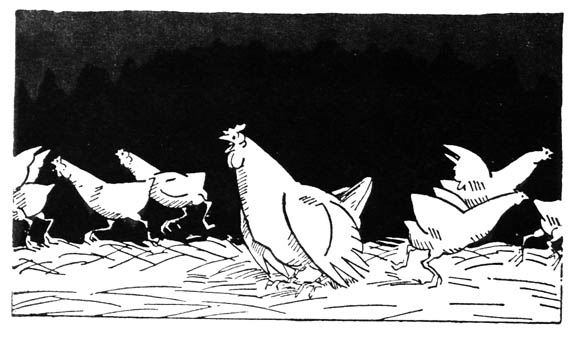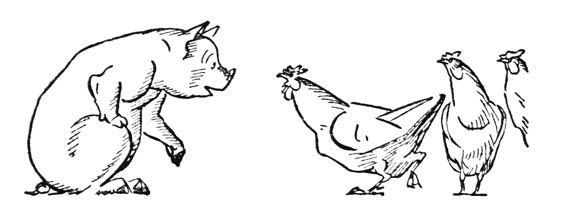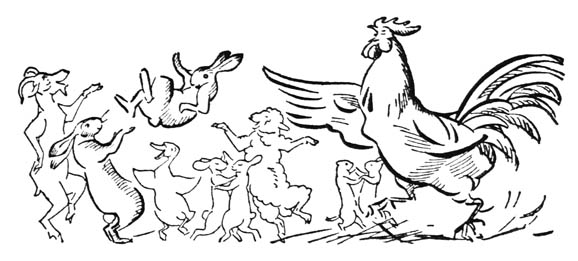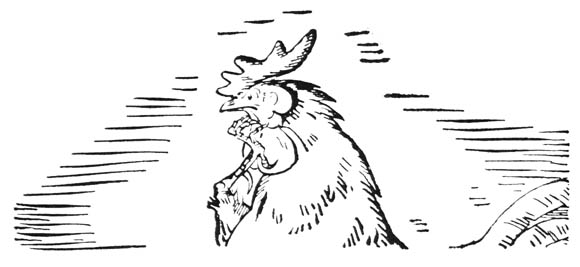

CHAPTER VIII
THE JUDGE DISAPPEARS
They found the hen-house in a great state of excitement. A flock of young chickens—Henrietta’s gawky, long-legged daughters—were crowding about their mother or dashing in and out on errands, and the older hens were running round distractedly, squawking and clucking, some of them bringing water in their beaks to sprinkle over one of their sisters, who had fainted, others merely hurrying aimlessly out of the door to stop and give several loud squawks and then hurry as aimlessly inside again.
At first the two detectives could get no answers to their questions in the general hubbub, but at last Freddy, losing patience, squeezed his way inside, seized Henrietta by a wing and pulled her over into a corner. “Come, now; what’s the trouble here?” he demanded. “Pull yourself together, hen, and tell me what’s wrong.”

Henrietta glared at him for a moment without seeming to see him. Then suddenly she seemed to recognize him, and burst out wildly: “You!” she cried. “You dare come here, you wretched pig, with your fine airs and your lordly ways—you that’s to blame for all this, you and all your smart friends that told him how fine it would be to be a judge! You are the one that got him into this, you imitation detective, you; you big chunk of fat pork!”
Freddy backed away a little. “Come, come, Henrietta,” he said soothingly. “Let’s not talk about me. I may be everything you say, but that doesn’t get us anywhere, does it? I don’t even know what’s the matter yet.”
But Henrietta’s rage was quickly spent. She broke down and began to cry. “He’s gone!” she sobbed. “My Charles, the finest husband a hen ever had! They’ve got him, my good, kind, noble Charles!”
Serious as the situation seemed, Freddy had to repress a grin. When Charles was around, Henrietta did nothing but scold him and tell him what a silly rooster he was. Outside the hen-house there was a strange whining, grumbling sound, and Freddy recognized it as Mrs. Wiggins’s giggle. But fortunately the hen did not hear it and went on with her story.
There wasn’t very much of it. Charles had been missing since late the previous afternoon. None of the animals on the farm had seen him.
Freddy suggested the only thing he could think of. “He may have gone visiting,” he said, “and been invited to stay all night.”
“He wouldn’t dare stay out all night!” flashed the hen. “Just let him try it once!” Then she began to cry again. “No, he’s gone. It’s one of those animals he sentenced to jail. There were a couple of them that said they’d get even with him when they got out. And now they’ve gone and done it. And I shall never see him again! Oh, my poor Charles! My noble husband!” And she flopped round in a violent fit of hysterics.
Freddy shook his head dolefully and went outside. “Come on,” he said to the cow. “Nothing more to be got out of her. We’d better get busy right away. Now, where in the world do you suppose he can be?”
“Off somewhere having a good time probably,” replied Mrs. Wiggins. “Though it is funny. Henrietta would peck his eyes out if he stayed out a minute after ten o’clock.”
“Yes,” said Freddy, “and none of the animals he has sentenced to jail have got out yet, so it can’t be that. Of course, he might have been carried off by a hawk, or had a fight with a stray cat. But, for all his bluster and boasting, Charles is too clever to be caught like that. I expect we’d better put the whole force on it to go round and find out all they can.”
So they got all their helpers together and sent them out in different directions to ask questions and look for signs of the missing rooster. Both Freddy and Mrs. Wiggins went out too. But when they met again late that evening, nothing had been found. Charles had vanished without leaving so much as a feather behind.
The next morning Freddy was up and out before the dew was off the grass, for this, he felt, was a case on which his reputation as a detective rested. It wasn’t just an ordinary disappearance. Charles was the judge, an important personage, and if he wasn’t found, and quickly, nobody would bring any more cases to the detectives.
He was on his way down to the cow-barn to get Mrs. Wiggins when he heard a loud moo behind him and, turning, saw that animal galloping toward him as fast as she could come.
“Come with me over to the jail,” she panted. “I’ve got something to show you. I went over there when I got up, to check over the prisoners and see that they were all there, because I thought some of them might have escaped and perhaps murdered Charles—though, goodness knows, none of ’em are mad at him for sentencing them. Quite the contrary. Just listen to them.”
The sounds of shouts and laughter and songs greeted them as they approached. Hank, from his stall, turned a weary eye on them as they entered. “I do wish you would do something about this,” he said. “I thought it was going to be company for me, having the jail here, but, my land! nobody wants company twenty-four hours a day! They just keep it up all night. I haven’t had a wink of sleep for ten days.”
Freddy nodded. “Yes, we’ll have to make some other arrangements. This jail isn’t a punishment any more at all. But we’ll talk about that later. What was it you wanted to show me?” he asked the cow.

Without speaking she led him to the door of one of the stalls, hooked the wooden pin out of the staple, and opened the door. Inside, some twenty animals and birds were crowded together. One group was in a circle, watching two rabbits doing gymnastic stunts. Another group, with their heads together, were singing “Sweet Adeline” with a great deal of expression. Mrs. Wiggins raised one hoof and pointed dramatically at a third group. In the center of it was the missing judge, declaiming at the top of his lungs.
“On with the dance!” declaimed Charles.
“Stop! Silence!” shouted Freddy, and Mrs. Wiggins stamped on the floor to get attention.
“Let joy be unconfined!” went on Charles dramatically. Then he saw the visitors, and his voice flattened out into a whisper.
Heads turned; the song died down; the groups broke up and surrounded the detectives.
Freddy pushed his way through them and confronted Charles. “What on earth does this mean?” he demanded. “What are you doing here? Don’t you know that Henrietta is half crazy with worry?”
“Why I—I’m in jail,” explained Charles a little hesitantly; then, gaining courage at the immediate applause which this remark drew from his fellow prisoners: “Tell Henrietta I’m very sorry,” he went on, “but I’m serving a six weeks’ sentence, and I can’t come home until my time’s up.”
“A sentence!” exclaimed Mrs. Wiggins. “But how can you be serving a sentence? You’re the judge. Who can sentence you?”
“The judge!” said Charles triumphantly. “I’m the judge, and I sentenced myself!”
“What for?”
“Well, I’ll tell you,” said Charles, now thoroughly at ease. “You see, two or three years ago I stole something. It doesn’t matter what it was. Well, then, when I was elected judge, that old crime worried me. Here I am, I thought, sentencing other animals to jail for crimes no worse than the one I committed, and yet I never served any sentence for it. It got on my nerves after a while. It didn’t seem right, somehow. What right had I to set myself up as better than these other animals and punish them for things when I was no better myself? The only fair thing, it seemed to me, the only just thing, the only honest thing, the only noble thing, was to punish myself. And so I did. I’m serving my sentence now.”
The other prisoners set up a cheer, but Freddy scowled. “Nonsense!” he exclaimed. “I’ll tell you why you’re here. You’re sick of being nagged at by Henrietta. I don’t blame you there—I shouldn’t like it either. And so you thought this would give you an excuse to stay away from home and have a good time. But you can’t get away with it, Charles. This jail isn’t a club. It—”
“But I stole something, I tell you,” insisted the rooster. “I’m only getting the punishment I deserve. I can’t get out.”
“You can and you’re going to,” said Freddy. “You never stole anything in your life. And how are you going to be of any use as a judge when you’re in jail yourself?”
“I don’t see why I won’t,” protested Charles. “Bring the prisoners down here and I can sentence ’em just the same, can’t I?”
“No, you can’t,” put in Mrs. Wiggins. “Come along, now. Henrietta’s waiting for you.”
“I’m not going,” said Charles.
Freddy turned and winked secretly at the cow. “Oh, all right, then,” he said. “Let him stay here. We’ll just have to elect another judge, that’s all. We’ll get Peter. There’s a lot of the animals thought he would be a better judge anyway, and there’ll be plenty more now, when this gets out.”
But this didn’t suit the rooster either. “You can’t do that!” he shouted, hopping up and down in his excitement. “You can’t do that! I was elected, and you can’t put me out that way.”
“Oh, can’t we?” said Freddy. “Don’t you know that a judge loses his job when he goes to jail? We don’t have to put you out. You’re just out, anyway. Unless, of course, you decide that there was some mistake about it and take back your sentence.”
For a few minutes the crestfallen rooster thought this over in silence. He was having a very good time in the jail. On the other hand, in jail he was really just one of the prisoners. And outside he was a judge, looked up to and respected by the entire community. Still—there was Henrietta. He knew that no story he could fix up would go down with Henrietta. And what she’d say—he shivered to think of it.

“Come on,” said Freddy. “Henrietta is taking on terribly. You don’t want her to feel badly, do you? She misses you, Charles.” And he repeated some of the things Henrietta had said, about how good and noble he was.
Charles looked up quickly. “She said that!” he exclaimed.
“She certainly did,” said Mrs. Wiggins.
“Well, then, I guess—I guess I’d better go back,” said the rooster. And he walked dejectedly out of the door and reluctantly took the path toward the hen-house.
That evening Freddy and Mrs. Wiggins were strolling down through the pasture, talking over the new problems that confronted them in their detective work. From the hen-house came the angry clucking and gabbling of Henrietta’s voice, going on and on and punctuated occasionally with Charles’s shrill squawks. They listened for a few minutes, then grinned at each other and walked on.
“It’s really a swell joke on us,” said Freddy. “We were looking for a missing rooster, and there he was in jail all the time—the one place nobody’d ever look for him.”
“We find ’em,” said Mrs. Wiggins complacently. “Wherever they are, we find ’em.”
Freddy grinned more broadly as a particularly agonized shriek came from the hen-house. “We’d have no trouble finding the judge tonight,” he said. “I bet that’s the last time he stays out all night.”
“He won’t have a tail-feather left by morning,” said the cow.